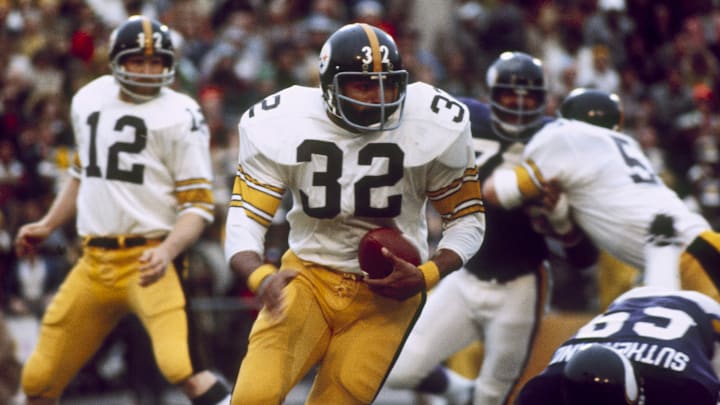There have been 22 100-yard rushing performance in Super Bowl history. Will there be a 23rd or even a 24th this Sunday? Regardless, seven running backs have earned Super Bowl MVP honors, and six have busts in Canton, Ohio.
Philadelphia Eagles’ running back Saquon Barkley is having an amazing first year in the City of Brotherly Love. He ran for 2,005 yards during the regular season, and has added another 442 yards on the ground in three postseason games. Could he join this impressive list with a huge performance against the reigning Super Bowl champion Chiefs on Sunday in Super Bowl LIX?
Larry Csonka, Dolphins (Super Bowl VIII)
The site was Houston’s Rice Stadium, and Don Shula’s Dolphins were in their third consecutive Super Bowl. A year earlier, Miami had achieved perfection with a 17-0 record, besting the Redskins in Pasadena, 14-7. This time, it was the Minnesota Vikings who stood in the way of a second straight Super Bowl title for the ‘Fins.
The Dolphins’ offensive line dominated the fabled “Purple Gang,” and fullback Larry Csonka was at his workhorse best. He finished with 33 carries for 145 yards and two touchdowns in an easy 24-7 win. Shula’s relentless club owned the line of scrimmage, totaling 53 rushing attempts for 196 yards.
Franco Harris, Steelers (Super Bowl IX)
The Steelers were making their first Super Bowl appearance, and a franchise that was born in 1933 was looking for its first NFL championship. In 1972, rookie running back Franco Harris produced the fabled “Immaculate Reception” in beating the Raiders in the divisional playoffs.
It was the final Super Bowl played at Tulane Stadium at New Orleans, and Harris was the main ball carrier for a team that rolled up 249 yards on 57 attempts. The former Penn State standout racked up 34 carries for 158 yards on Minnesota’s fabled defense. The 16-6 win was the first of the Steelers’ four Super Bowl wins in the 1970s.
John Riggins, Washington (Super Bowl XVII)
The 1982 NFL season had been reduced to nine regular-season games for each team, and the quest for Super Bowl XVII turned into a 16-game tournament. Joe Gibbs led Washington to a 8-1 mark in his second season with the club. Kicker Mark Mosely was the league’s MVP. John Riggins caught fire come playoff time, and put together a four-game run (610 yards) which has yet to be equaled.
He ran over the Lions (119), Vikings (185), and Cowboys (140) for 44 yards and three scores in the NFC playoffs. Riggins totaled a Super Bowl record 38 attempts, good for 166 yards and a touchdown in beasting the Dolphins, 27-17.
Marcus Allen, Raiders (Super Bowl XVIII)
The Los Angeles Raiders’ 38-9 conquest of the defending Super Bowl champion Redskins in Tampa was thorough. Tom Flores’s team scored on offense, defense, and special teams in the first half. The defense held a team that had scored a then-record 541 points to a touchdown and a field goal.
Then there was Marcus Allen, who had totaled just 11 carries for 51 yards at intermission. He finished the game with 20 attempts for 191 yards and a pair of trips to the end zone. Allen’s 74-yard touchdown run on the final play of the third quarter remains goosebump worthy. Amazingly, it’s the last Super Bowl title for the Raiders.
Ottis Anderson, Giants (Super Bowl XXV)
He was a member of the Giants’ first Super Bowl title team in 1986. Ottis Anderson added quality depth behind Joe Morris for Bill Parcells’s XXI champions. This time around, he became the focal point of a ball-control attack that would prove pivotal when facing an explosive Buffalo Bills’ offense.
Big Blue ran for 172 yards that day in Tampa against Marv Levy’s team, and Ottis Anderson had 102 of those yards and a touchdown on 21 carries. The Giants’ offensive line could have been named Super Bowl MVP as Parcells’s squad owned the ball for an astounding 40:33 in a memorable 20-19 upset of the stacked AFC champions.
Emmitt Smith, Cowboys (Super Bowl XXVIII)
The Cowboys were defending Super Bowl champions, humbling the Buffalo Bills in Super Bowl XXVII in Pasadena, 52-17. Dallas opened the 1993 season without Emmitt Smith thanks to a contract dispute. Jimmy Johnson’s team dropped their first two games, but the future Hall of Famer would return and the Cowboys finished 12-4.
He still wound up leading the NFL in rushing yards for the third straight year. Smith was held to under 100 yards in the team’s first two playoff wins, but he saved his best for this Super rematch with Buffalo. He totaled 132 yards rushing in two scores in Dallas’ 30-13 victory over the Bills.
Terrell Davis, Broncos (Super Bowl XXXII)
Mike Shanahan’s team was poised for a Super Bowl appearance in 1996, but were stunned at home by the Jaguars in the AFC Divisional Playoffs. The Broncos finished 12-4 in 1997, but settled for a wild card invitation. Terrell Davis was in the midst of a big season, and really caught fire during the postseason.
He battered the Jaguars, Chiefs, and Steelers for a combined 424 yards on the ground and five touchdowns in three playoff games. Next up were the defending Super Bowl champion Packers. Davis ran for 157 yards and three scores, and Denver ended the NFC’s 13-game Super Bowl winning streak via a 31-24 upset.
